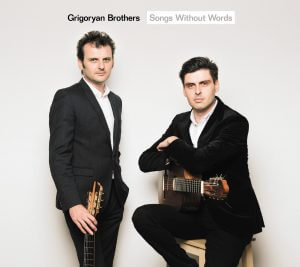Slava Grigoryan & Leonard Grigoryan (guitars)
ABC Classics CD 481 5101
TPT: 53’ 34”
reviewed by Neville Cohn
 If ever you’ve come home after a really tough day at the office, perhaps an accidental wiping of a crucial report that cannot be retrieved and/or encountering a maddening traffic jam on the way home – what might one do?.
If ever you’ve come home after a really tough day at the office, perhaps an accidental wiping of a crucial report that cannot be retrieved and/or encountering a maddening traffic jam on the way home – what might one do?.
A few soothing gins and tonic or something a bit stronger might be just what’s needed to soothe frazzled nerves – but there’s another, frankly better, way to chill out (without any risk at all of a hangover): put the Grigoryan brothers’ newest CD on – and relax to a joint effort that’ll work its magic in mere moments.
Seventeen tracks enshrine some of the world’s most loved melodies.
Take your pick: Rachmaninov’s Vocalise, Elgar’s Chanson de matin (a charmladen delight) and a Seguidilla, the bracing urgency of which rivets the attention. It’s from an arrangement for two guitars of the full set of de Falla’s Seven Spanish Folk Songs.
I particularly like the gently lulling quality of Nana which, Falla has pointed out, was a song his mother used to sing to him when very young. These delights are given near-flawless treatment, not least the first of the set: The Moorish Cloth. It’s beautifully negotiated with its crisp rhythmic underpinning. There’s a lively, lovely account of the Jota, its rhythms irresistible – and the Cancion is finely considered. The very challenging Polo needs a greater sense of urgency, though.
The brothers’ account of Tchaikowsky’s None but the Lonely Heart would surely charm even the grumpiest bird from a twig – and there’s an exquisitely languid account of Ponce’s Little Star.
There are sure to be tracks which listeners will happily play over and over – and over – again. Don’t take my word for it. Get yourself a copy – and feel those nerve knots relaxing.



